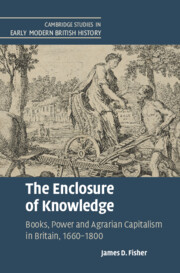Book contents
- The Enclosure of Knowledge
- Cambridge Studies in Early Modern British History
- The Enclosure of Knowledge
- Copyright page
- Dedication
- Contents
- Figures
- Tables
- Acknowledgements
- Notes
- Abbreviations
- Introduction
- Chapter 1 Rethinking Agricultural Books, Knowledge and Labour
- Chapter 2 Learning without Books
- Chapter 3 Standing on the Shoulders of Peasants
- Chapter 4 Learning without Labour
- Chapter 5 Dividing Head and Hand
- Chapter 6 Monopolising Knowledge
- Chapter 7 The Master Should Know More
- Conclusion
- Appendix
- Bibliography
- Index
Chapter 2 - Learning without Books
The Mystery of Husbandry
Published online by Cambridge University Press: 07 July 2022
- The Enclosure of Knowledge
- Cambridge Studies in Early Modern British History
- The Enclosure of Knowledge
- Copyright page
- Dedication
- Contents
- Figures
- Tables
- Acknowledgements
- Notes
- Abbreviations
- Introduction
- Chapter 1 Rethinking Agricultural Books, Knowledge and Labour
- Chapter 2 Learning without Books
- Chapter 3 Standing on the Shoulders of Peasants
- Chapter 4 Learning without Labour
- Chapter 5 Dividing Head and Hand
- Chapter 6 Monopolising Knowledge
- Chapter 7 The Master Should Know More
- Conclusion
- Appendix
- Bibliography
- Index
Summary
Chapter 2 establishes the context usually neglected by histories of agricultural literature: how farming was learned without books in the prevailing system of knowledge in the sixteenth and seventeenth centuries. It examines the discourse on the ‘mystery of husbandry’ (and closely associated discourse of ‘secrets’), a term denoting the knowledge and skills acquired by experienced practitioners that were inaccessible to amateurs, to both elucidate contemporary beliefs about learning through labour and to indicate the ways in which the publication of husbandry manuals disrupted existing notions of expertise. In doing so, it explores the parallels between craft and farming knowledge and borrows ideas from modern studies to argue that early modern husbandmen and housewives would have possessed a ‘peasant epistemology’ analogous to an ‘artisanal epistemology’. The chapter argues that when linked to broader socio-economic changes in farming, the emergence of the term ‘mystery of husbandry’ in the seventeenth century can be seen as a symptom of tectonic shifts in the social system of agricultural knowledge. In short, the knowledge of husbandry was being commodified in an increasingly competitive commercial environment.
- Type
- Chapter
- Information
- The Enclosure of KnowledgeBooks, Power and Agrarian Capitalism in Britain, 1660–1800, pp. 60 - 88Publisher: Cambridge University PressPrint publication year: 2022

